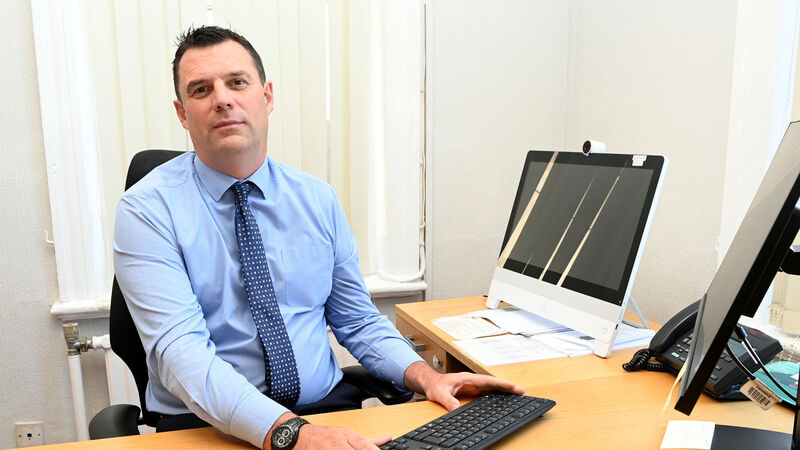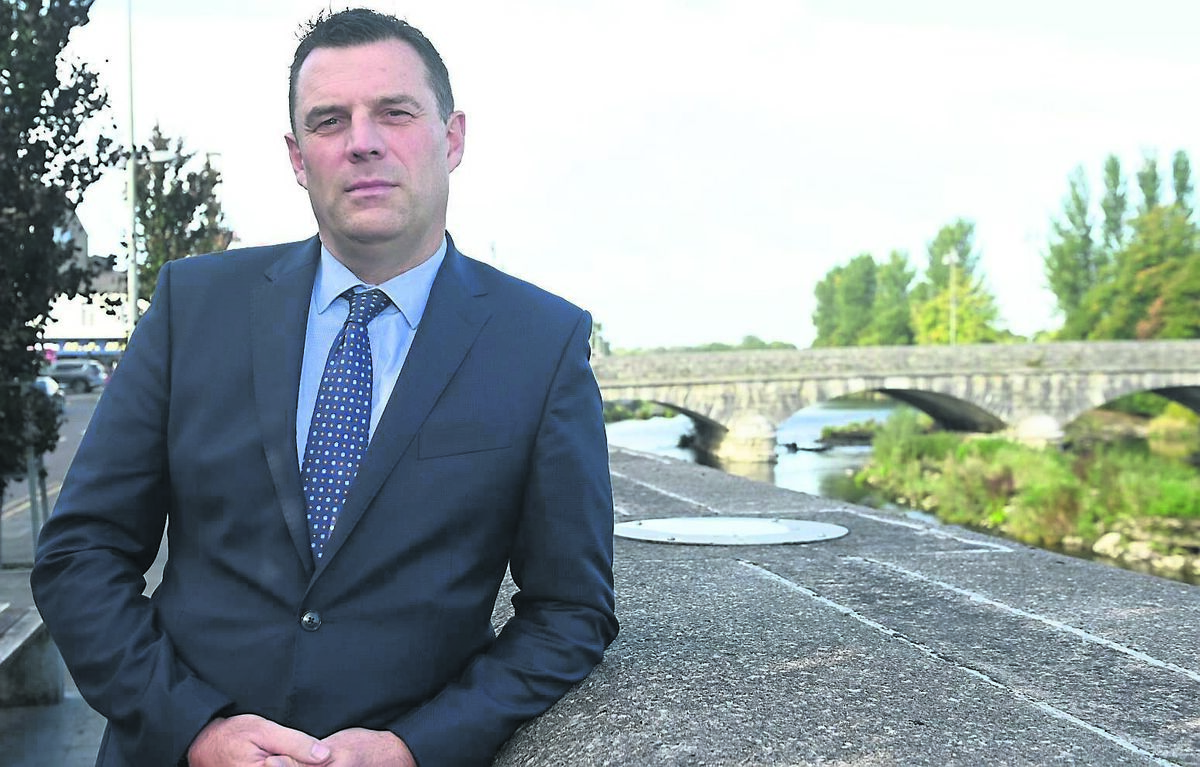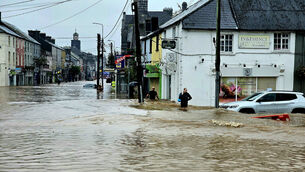'It's our job to try to protect you': Gardaí break cycle of abusive relationships

Fermoy native Detective Chief Superintendent Colm Noonan, of the Garda national protective services bureau . Picture; Eddie O'Hare
“IF there is one message that we would really like to get out there to people who have suffered domestic, sexual, or gender-based violence, it is that An Garda Síochána is here to help you, and we will help you,” Detective Chief Superintendent Colm Noonan told The Echo.
“If you are in an abusive situation, the gardaí are here to protect you and to get you out of that situation, that’s our job, to try and protect you.”
Chief Supt Noonan is the head of the Garda National Protective Services Bureau. He has served previously in Dublin, Templemore, and Anglesea Street, and as superintendent in Midleton and Gurranabraher. His office is in Harcourt Street in Dublin, but he met The Echo at the garda station in his native Fermoy.
The bureau published a landmark report at the end of September which showed that domestic abuse was a factor in a majority of murders and manslaughters last year.
The report, entitled ‘Crime Levels and Garda Operational Responses for Domestic, Sexual and Gender-Based Violence’, contained an analysis of domestic, sexual and gender-based violence incidences collected from the garda Pulse system, and showed an increase of 399% in domestic abuse motivations for sexual offences from 2020 to 2021.
The data showed there were 205 sexual offence incidents with a domestic abuse element recorded in 2020, compared to 817 in 2021. The introduction of a victim-offender relationship field on Pulse in July 2021 has led to the identification of additional incidents where there was a domestic abuse element. The statistics show that 77% of victims of domestic violence victims are female.
Cultural shift
Chief Supt Noonan said the report reflected a cultural shift, within society and within An Garda Síochána, in attitudes toward domestic violence.
“Part of this is the victim-offender relationship, which means we understand the assault that happened wasn’t just an assault on a woman, it was an assault on a woman committed by her partner, and because that’s an intimate relationship, that means it’s a domestic incident.
“That means there’s enhanced victim support, with the potential for barring orders, protection orders, interim barring orders, all that world of the protection of a victim of domestic abuse comes into play, because we understand the incidents an awful lot better,” he said.
“Part of it is the fact that we can accurately look at the data, but the more important bit is that cultural shift within An Garda Síochána. What we want our members to understand is that no matter what domestic incident they’re going to, or whatever call they’re responding to, that person is very vulnerable.
“If it’s a domestic incident, this is a huge step for them to contact An Garda Síochána. You could have eight or nine incidents a woman will endure of domestic abuse before she feels she’s able to contact the police, that’s a worldwide figure,” he added.
“The gardaí in our Divisional Protective Services Units across the country are being trained specifically in how to deal with domestic abuse. We have a specific training course around domestic violence orders so that if a garda comes into a house at three o’clock in the morning, they’re able to give the right advice and say: ‘You are entitled to go to court for this and we can help you go to court for this to protect you in the home or to protect your children in the home or to get the offender out of the home if necessary.’” He described this as part of a sea change in attitudes, both within the force and within society.
“We don’t want gardaí to go to a domestic incident and say ‘ah sure, it’s just a row between a husband and a wife’. Those days are gone, and the tolerance for that has to be gone, and that’s what the Minister for Justice’s third national strategy is titled ‘zero tolerance’.” A major concern for the Garda National Protective Services Bureau, he said, is nationwide consistency.
“If a person is living in Donegal, West Cork, or Kerry, wherever they’re living, it’s vital they get the same consistency of service, that we won’t have a scenario where a victim of domestic abuse is saying, ‘I rang the guards, the guards told me ’tis a thing and nothing’ or ‘the guards told me that they couldn’t come out to me’, it’s vital that every single person who’s potentially a victim of domestic abuse gets the same level of service.
“You’ll only achieve that by training, and we monitor how that training is going.”

The Garda National Protective Services Bureau is responsible for the District Protective Services units (DPSUs), which offer a consistent, professional, and victim-focused approach to the investigation of specialised crime types, including sexual crime, human trafficking, child abuse and domestic abuse. There is a DPSU in each of the 26 garda divisions, with 392 people attached to those units.
Increase in reporting
Mary Crilly of the Sexual Violence Centre in Cork has praised the DPSUs as a major step forward, and she believes that recent sharp increases in rape, sexual assault, and domestic violence figures do not necessarily reflect an increase in actual incidents, but rather represent an increase in victims and survivors feeling confident to come forward.
Chief Supt Noonan said he had worked with Ms Crilly many times, and agreed with her assessment.
“People feel more confident in the gardaí. They’re trusting us, to be able to contact us and to have the first interaction, but then they are trusting us to really take on the investigation properly, that we have the right skills, we have the right expertise, we have the right contacts, we have the technical expertise, we have the engagement with the support agencies, that it’s step one to the end of the prosecution and the conviction hopefully, that there’s a trust in the journey and that’s something that has changed.”
He said DPSUs are currently receiving specific in-person training around their roles, covering such topics as: engagement with victim, consent, child sexual abuse reporting, online child exploitation, support service for children, rape crisis network, diversity and integration, and unconscious bias.
“Unconscious bias is when people ask ‘why didn’t she leave, why didn’t she just go, why didn’t she walk out the door?’. Well, the fact of the matter is she had nowhere to go, she couldn’t walk out. It’s the wrong question to ask any victim of domestic abuse.”
Operation Faoiseamh
At the outset of the pandemic, gardaí launched Operation Faoiseamh to provide support to victims, and that operation resulted in the number of call-backs increasing by 1,000 over a six-month period to June 2020. Chief Supt Noonan said that a dividend of Operation Faoiseamh has been a heightened level of trust in gardaí.
“Reports of incidents are rising, but to agree with Mary Crilly, we believe they are rising because a woman will trust An Garda Síochána that ‘they will listen to me, they will believe me, and they will launch an investigation, or give me the advice on orders, or help me get the orders that will lead to an investigation and prosecution’.”
Coercive control is something which has only been recently recognised as a crime under Irish law. Chief Supt Noonan described it as a behavioural offence.
“It’s not like I went into a shop and I stole something, or I physically assaulted someone, it’s how I’m treating you as a person. Am I controlling your finances, am I controlling who you can meet, who you can contact? Am I looking at your phone, am I monitoring the location on your phone, am I telling you what you can wear and how you can behave in public?
“A coercive controller is controlling, invariably, a woman’s life, because of his own nature and his own particular way of functioning, but that’s criminal now. That is a criminal offence, coercive control, and you will be prosecuted.”
He added that, invariably, coercive controllers are also physically and sexually abusive of their partners.
“As my colleague, Detective Sergeant Laura Sweeney, who is our go-to person on coercive control, would say, ‘you can’t really imagine that this man is controlling every other aspect of this woman’s life and isn’t controlling the behaviour in the bedroom’.
“In a coercive control relationship, the controller controls everything.
“That control extends to money, cars, your social life, your dress, how you speak to people, what you cook, if the dinner isn’t ready, lists of jobs to have done before I come home from work, ticked off and if you don’t tick them off, you’re clattered, it’s a horrendous crime.
“Coercive control can last for years, but we have also seen a couple of convictions where, from the progression of relationship to coercive control to end of relationship, was 12 or 14 weeks. It went so intense from day one, the relationship was just dysfunctional from the very first hour.”
Intense courtship practices, such as “love bombing” can often be a precursor of coercive control, he said.
“There’s huge expressions of love and ‘I can never live without you’, and ‘you’re my soulmate’ and all this kind of stuff. Early pregnancy is often a feature, early cohabiting is often a feature.
“A relationship that goes very, very quickly is often, although obviously not always, a sign of coercive controlling behaviour, and it can get really sinister.”
Here to listen
Detective Chief Superintendent Noonan said that on the centenary of the foundation of An Garda Síochána, its mission statement applies now as much as ever.
“We want to see the cycle of domestic, sexual, and gender-based violence broken, we want to ensure we have a society where it’s unacceptable, will never again be tolerated, and won’t be unspoken. We’re here to listen, so please keep talking to us.
“We can and we will do everything to pursue those that hurt others, because be they a guard, a judge, a solicitor, a shopkeeper, a truck driver, a farmer. or whatever they are, the perception through the years was that men were getting away with domestic abuse and they weren’t prosecuted for it, but that’s over now,” he said.
“As gardaí, we reflect society’s values, and a lot of us have families ourselves, have children ourselves, and we have to reflect the society we want for our own loved ones, for our own children.
“The mission statement of An Garda Síochána is about keeping people safe, and everything we do should reflect that, whether it’s helping victims of domestic abuse, sexual abuse, child abuse material, and we have to do everything we can to help victims, to understand them, and to do everything in our power to protect them, that’s our job in a nutshell.”
To report or discuss an incident of domestic or sexual violence, call 112/999 or contact your local garda station. Women’s Aid: 1800-341900. National 24-Hour Rape Crisis Helpline: 1800-778888.







 App?
App?


